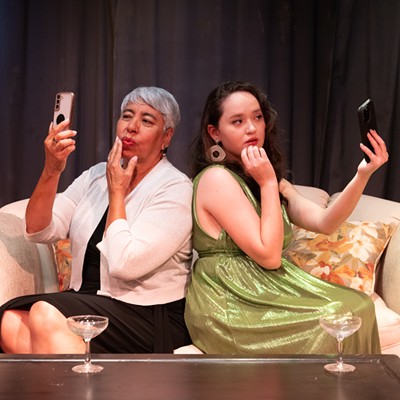Support Us
Houston's independent source of
local news and culture
account
- Welcome,
Insider - Login
- My Account
- My Newsletters
- Contribute
- Contact Us
- Sign out
After All Media Passes Were Canceled, We Decided to See White Rabbit Red Rabbit Anyway
Jessica Goldman September 22, 2016 8:00AM
[
{
"name": "Related Stories / Support Us Combo",
"component": "11591218",
"insertPoint": "4",
"requiredCountToDisplay": "4"
},{
"name": "Air - Billboard - Inline Content",
"component": "11591214",
"insertPoint": "2/3",
"requiredCountToDisplay": "7"
},{
"name": "R1 - Beta - Mobile Only",
"component": "12287027",
"insertPoint": "8",
"requiredCountToDisplay": "8"
},{
"name": "Air - MediumRectangle - Inline Content - Mobile Display Size 2",
"component": "11591215",
"insertPoint": "12",
"requiredCountToDisplay": "12"
},{
"name": "Air - MediumRectangle - Inline Content - Mobile Display Size 2",
"component": "11591215",
"insertPoint": "4th",
"startingPoint": "16",
"requiredCountToDisplay": "12"
}
,{
"name": "RevContent - In Article",
"component": "12527128",
"insertPoint": "3/5",
"requiredCountToDisplay": "5"
}
]
I’m sitting in a room with 55 other people watching an actor perform a solo play she knows absolutely nothing about. Which is quite fitting, really, as the company putting on the play has no idea that I’m here reviewing it. To put it into Rumsfeldian terms, we have a known unknown — the actor is fully aware she knows squat about the play. We also have an unknown unknown — the company is in the dark that a critic is at the show. I suppose we also have a known known if you count that I’m cognizant of not only both situations, but also the frustrating series of events that brought me to this room.
If this all sounds far too cloak-and-dagger-like for the usually convivial and veridical world of theatrical arts, let me catch you up on how we got to this place.
Basic facts first. The actor is Emily Trask, the company is Alley Theatre and the show is Iranian playwright Nassim Soleimanpour’s 2010 international absurdist hit White Rabbit Red Rabbit. That the show gets pegged as artistically absurd could just as easily refer to how the play is staged as it could to its content. In a leap of equal parts trust and guts, the actor tasked with performing the piece is not allowed to read or, we assume, Google the play in advance. Rather, once the performer has arrived onstage, he or she is given a sealed envelope containing the script, which the actor then opens in front of us, and begins turning Soleimanpour’s words and ideas into action.
Intriguing, right? I certainly thought so and therefore, when the Alley first announced it was producing the show, I jumped at the chance to review. This was back in July when the cold reads were being handled by Alley regulars James Black, Melissa Pritchett, Chris Hutchison and Elizabeth Bunch. Black was the first one slated to give it a go, and so with invitation to come review in hand, I was set to make my way to the theater.
That’s when the weirdness started.
A mere few hours before curtain, I was informed that suddenly my invitation to review was revoked. Not just for Black’s performance, but for any of the White Rabbit Red Rabbit shows. However, if I wanted to pay for a ticket and attend, I was welcome to do that, I was told. A couple of quick calls around to my theater critic colleagues confirmed that they too had been given the boot. But why?
One clue lies in the secretive/sensitive nature of the play. “Please do not reveal spoilers regarding the subject matter of the play,” read the pleas in the Alley press materials. Indeed, no matter where the show is produced, media/critics are sternly warned not to discuss in detail what transpires during the 70-minute play. There have even been cases in which critics have been required to sign contracts assuring producers that they will comply with this condition. This is a play that’s intended to be as much a surprise for the audience as it is for the actor.
And yet still, even with these concerns and constraints, critics all over the world were welcome to review. And review they did, as any quick Internet search will reveal. So was the Alley suggesting that somehow Houston critics aren’t as professional as critics in other cities or countries? That we can’t be trusted to work within the parameters our colleagues have accepted? Does the Alley consider us naughty children who can’t help but spill the milk?
Or is it that we aren’t smart enough? When Soleimanpour wrote White Rabbit Red Rabbit, he was forcibly passport-less, unable to leave Iran because of his refusal to take part in compulsory military service. His response was to pen a monologue that could travel for him. While a different actor takes on the role in each and every production, it’s Soleimanpour’s voice and thoughts the actor is delivering. That person is his proxy. Given Soleimanpour’s situation, many have assumed (despite his assurances to the contrary) that the play is a condemning commentary on the oppressive country in which he then lived.
“This play is not overtly political, and should not be portrayed as such. It operates on a deeper, metaphoric level, and very expressly avoids overt political comments. We therefore ask the press to be judicious in their reportage.” This again from the Alley’s press materials.
Pretty clear, I think. So what’s the deal? Did the Alley suddenly feel that the critics it has respectfully worked with for years were unable to grasp this concept? Were we just too dense to understand what “deeper metaphoric level” means? Or maybe we were barred from reviewing because the show, with only a handful of performances in front of a small audience, sold out almost immediately and therefore had no need for us anymore.
Truth is, I have no idea why the decision was made. Probably won’t ever know. But the truth also is that while a company can take away a critic’s passes for a show, it can’t stop that critic from buying a ticket and writing a review anyway. Freedom of the press and all, sure, but mostly just because an important show like this deserves to be observed and commented on. So when the Alley announced that it was extending the show with extra performances, my editor and I agreed, I would buy a ticket and do the job I had originally set out to do.
That job, it turns out, is a happy one. Despite my peeved bafflement over what transpired before I saw the show, once I was there, I had nothing but positive things to say. And by say I mean in the most general of terms. Not out of fear of repercussions, but because to do otherwise would ruin the experience for others and that’s not how I roll. Sure, this makes it difficult to review in the traditional sense, but it doesn’t mean the play can’t be talked about in some meaningful way.
So let’s start with this: Emily Trask was terrific. Not only was she a good sport about the daunting task of performing cold and on the spot; she made it seem effortless. Soleimanpour’s words flowed off her tongue so expertly that it was hard to remember this was the first time she’d been exposed to the script. If nothing else, then, this is a show that gorgeously tests and highlights the mettle of an actor, and in this case we were greatly rewarded.
As for the play itself, it’s definitely not a linear story with traditional methods. White Rabbit Red Rabbit is more of a metatheatrical, stream-of-consciousness, heavily allegorical experience. If that sounds too heavy, let me assure you that it skews more humorous than not, with audience participation lighting the way for much of the fun. Plus the title is not for nothing. Yes, there are rabbits of dual colors in the show as well as some other unexpected critters, all spoken of in quite modern parlance, with a nice sprinkling of four-letter words thrown in for good measure.
Yet underneath all the cute oddness of the structure and story is a kind of haunting that discomforts us with provocative questions about control, obedience, freedom, group mentality and the dark side of human nature. We hear Soleimanpour’s words and stage directions, as recited by Trask, and while we may not grasp the full extent of what he’s trying to convey to us at every juncture, we get the idea that it’s not all adorable cotton tails and twitching noses.
For sure the play is not for everyone. I heard one couple leaving the show in this exchange:
Him - “What did you think it was about?”
Her – “Living in Iran obviously gives you mental illness.”
Not quite what Soleimanpour was going for, I’m fairly sure, but hey, they were thinking about the show at least. And for me, this is the beauty of White Rabbit Red Rabbit – it does make you think. My thoughts on coming out of the play swirl around the nature of compliance between writer and actor, between actor and audience, between audience and society and between the one who leads and the ones who either follow or simply wait and watch. I think about who gets to decide for whom and at what cost?
This to my mind is what Soleimanpour was after and what makes the Alley’s decision to shut the doors to critics so ironic. To put on a play that examines the nefarious and potentially harmful outcomes of control while at the same time regulating who gets to write about it seems to me to be hypocritical in the extreme.
Soleimanpour offers up his email address several times in the play, asking the audience to get in touch with him about how the performance is going. Perhaps I’ll message him and describe all that I’ve now told you. I wonder what he’d say? I suspect that like his play, his response would be funny, odd and provoking and would be discomforting for those he felt needed the spanking, whoever they may be.
*This was the last scheduled performance of White Rabbit Red Rabbit at the Alley and the only performance we were able to secure a ticket to. Fingers crossed the Alley decides to once again extend the performance and give new actors and audiences the opportunity to experience this unique theatrical experiment.
KEEP THE HOUSTON PRESS FREE...
Since we started the Houston Press, it has been defined as the free, independent voice of Houston, and we'd like to keep it that way. With local media under siege, it's more important than ever for us to rally support behind funding our local journalism. You can help by participating in our "I Support" program, allowing us to keep offering readers access to our incisive coverage of local news, food and culture with no paywalls.
Jessica Goldman was the theater critic for CBC Radio in Calgary prior to joining the Houston Press team. Her work has also appeared in American Theatre Magazine, Globe and Mail and Alberta Views. Jessica is a member of the American Theatre Critics Association.
Contact:
Jessica Goldman
Trending Arts & Culture
- Reviews For The Easily Distracted:
Deadpool & Wolverine - And Then There Were None at the Alley Leaves You Guessing Till the Very End
- Theater Magic: The Wizard of Oz at Queensbury Theatre
-
Sponsored Content From: [%sponsoredBy%]
[%title%]

Don't Miss Out
SIGN UP for the latest
arts & culture
news, free stuff and more!
Become a member to support the independent voice of Houston
and help keep the future of the Houston Press FREE
Use of this website constitutes acceptance of our
terms of use,
our cookies policy, and our
privacy policy
The Houston Press may earn a portion of sales from products & services purchased through links on our site from our
affiliate partners.
©2024
Houston Press, LP. All rights reserved.





